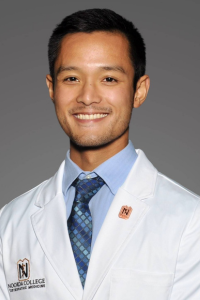Embracing Heritage and Healing: How My AAPI Roots Guided My Path to Osteopathic Medicine
Published May 21, 2024
Inside OME

By Vincent Tran, OMS I, Noorda College of Osteopathic Medicine
The Asian-American and Pacific Islander (AAPI) community brings with it a wealth of tradition, rich in promoting mental, physical and spiritual health. This approach of mind, body and spirit spoke to me when I began my journey in becoming a physician. My Vietnamese heritage has impacted many aspects of my life such as my beliefs, values and my pursuit of osteopathic medical education. My decision in choosing osteopathic medicine boiled down to my upbringing.
Through my parents, I took refuge in the precepts of Mahayana Buddhism, receiving the Dharma name, Tuệ An Tri, from a precept master. Ultimately, I was taught that the way to enlightenment came by first alleviating the suffering of others, providing me with a constant reminder of why empathy plays such an important role in practicing osteopathic medicine.
Oddly enough, outside of my Eastern household, I went to Catholic school for a good chunk of my early life. I became hyperaware at an early age that all my classmates did not share a similar experience at home as I did, and I was stuck in a dichotomy distinguishing what was the “best” practice. It took deep introspection for me to realize that there’s multiple answers to this “best” practice and I feel blessed to have taken in two cultures growing up.
Both religions emphasize respecting our fellow humans and contributing to the common good, with some subtle differences. These differences are what make them unique while still having the same goal in mind. This is comparable to the United States’ Marine Corp and Army having distinct mottos to achieve similar goals of protecting their country: “Always Faithful” and “This We’ll Defend,” respectively. I view what differentiates an MD and DO as analogous to how each branch of the military operates under their own unique mottos. DOs and MDs work toward similar goals, but are guided by different principles, and the DO motto resonated most strongly with me.
I’m so thankful to have my AAPI roots because my heritage keeps me open-minded to the patients I will encounter as an osteopathic physician. Many of my patients will be like my parents, individuals of a non-Western culture taking on an alien environment, and it is my job as an osteopathic physician to be as approachable as possible. This starts with proposing a treatment plan that is not only backed by scientific evidence but incorporates the customs of my patients. Any time my siblings and I had an ache or a sore muscle, I remember my parents using an oil called Dầu Xanh, which directly translates to “Green Oil.” Interestingly, we also applied it when we had the cold or flu. Many would dismiss this as an alternative medicine. However, it turns out the oil contains substances such as methyl salicylate, a derivative of aspirin. This is just one of the many ancient treatments of Southeast Asian culture, and I hope to be receptive to the new medications that the rest of the AAPI’s rich community has to offer.
The month of May is such an important month for me and so many others who have AAPI roots, celebrating all the achievements and contributions our people have made in the United States. I hope to spread more awareness of our rich history and traditions. Though our community is filled with love and compassionate individuals, injustices still exist in the world, and the importance of educating everyone to be accepting of each other cannot be emphasized enough. For this month, I not only want to celebrate AAPI but also promote the month of Mental Health Awareness.
Individuals faced with wrongdoing because of their background have not only their community’s support, but the support of professionals who can navigate them through the coping process. This extends to those fortunate enough to not be a victim of mental health challenges. As it is customary to have an annual physical with your physician, I firmly believe in having an annual “psychological,” something that I have just recently begun. I’m grateful to be a part of the NoordaCOM family who have provided their students with a plethora of mental health resources. Many of us are taught to build our personal framework through individual autonomy, an important aspect to have, but we can only truly flourish with a stout central support system. To my AAPI folks and my colleagues in medicine, I hope you keep your strength, or as my parents would always say, “Giữ Sức.”
